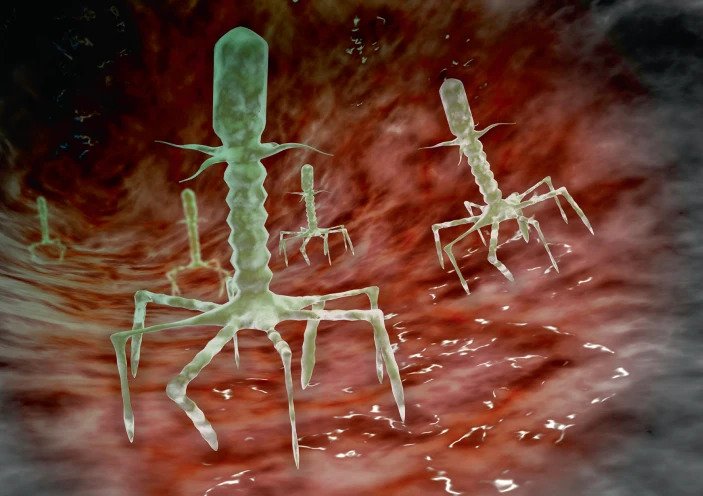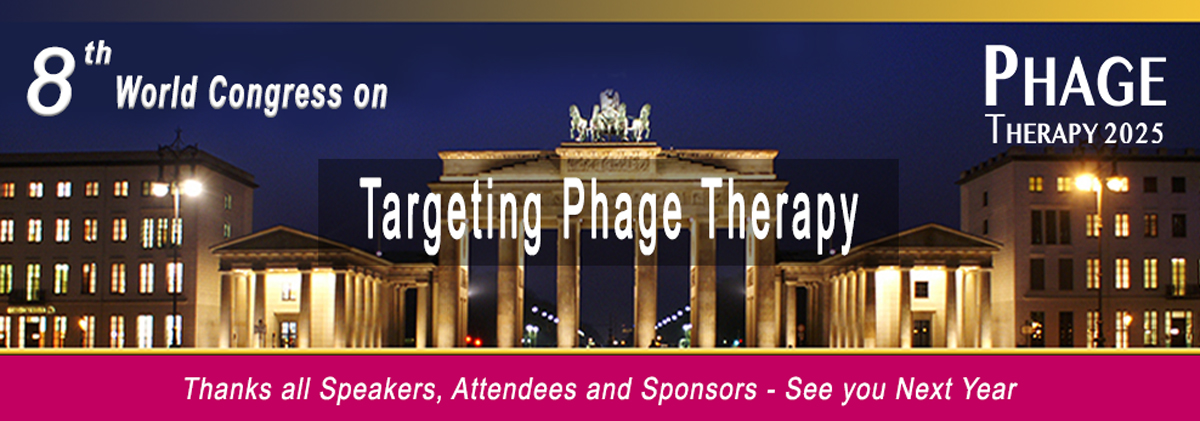
Phages offer a possible solution to bacterial infections that become resistant to antimicrobial agents. Credit: Stocktrek Images, Inc./Alamy Stock Photo
Biotech companies are racing to test bacteriophages — some as found in nature, others armed with CRISPR–Cas — to destroy drug-resistant bacteria selectively while keeping the microbiome intact.
Bacteriophages are attracting investor support to do the near impossible: remove harmful bacteria while leaving beneficial strains alone. Whether naturally occurring bacteriophages that infect and kill specific bacteria or ones engineered by CRISPR–Cas to target and deliver a lethal payload, what these small viruses have in common is that they do the job while leaving the rest of the microbiome intact. In February BiomX, of Ness Ziona, Israel, announced $7.5 million in funding for their phase 2 clinical trials in people with cystic fibrosis who have Pseudomonas aeruginosa infections. Armata Pharmaceuticals is also testing an inhaled phage cocktail therapy to treat P. aeruginosa associated with cystic fibrosis. In January, Armata announced $30 million convertible credit agreement to fund phase 2 trials. So far, big pharma and investors have been slow to jump in, but growing evidence to support the use of these agents, especially against the threat of multidrug-resistant bacteria, is changing that.
Phages are small viruses that infect and eliminate specific bacterial strains. Unlike antibiotics, phages are so specific they infect neither mammalian cells nor the rest of the bacteria in the microbiome. This ability to edit — rather than destroy — microbial communities is one of phages’ main assets, and scientists are enhancing their exquisitely specific killing prowess by equipping them with CRISPR-based targeted payloads.
Paris-based biotech Eligo Bioscience deploys bacteriophages that are both specific for certain bacteria and engineered to deliver CRISPR to eliminate the bacteria, an approach they call microbiome gene therapy. “When you deliver CRISPR to a bacterium, the double-stranded break caused by the CRISPR nuclease cannot be repaired and so the bacteria die,” explains Xavier Duportet, CEO and co-founder at Eligo.
In a 2014 paper, Duportet and colleagues showed that the ΦNM1 phage, which naturally infects Staphylococcus aureus, can be engineered to deliver CRISPR–Cas9 to the methicillin resistance gene. They demonstrated in preclinical tests that this phage exclusively targets methicillin-resistant Staphylococcus aureus (MRSA). The phage will “kill the bacteria that contain toxin genes, or antimicrobial resistance genes, or pro-inflammatory genes, while leaving the rest of the strains from the same species completely intact,” says Duportet.
Eligo’s most advanced antimicrobial is for treating acne vulgaris, a skin condition caused by Cutibacterium acnes. Some bacterial strains produce the pro-inflammatory peptide CAMP1 (Christie–Atkins–Munch–Petersen factor 1), which binds to Toll-like receptor 2 (TLR2) — a mediator of innate immunity in skin cells — triggering inflammation. Although antibiotics can successfully treat the condition, they also wipe out beneficial C. acnes, which have a major role in skin homeostasis. Eligo has engineered non-replicative bacteriophages to deliver an RNA-guided CRISPR–Cas nuclease designed to cut CAMP1. Eligo signed a $224 million deal with London-based GlaxoSmithKline in January 2021 that will fund preclinical research into EB005, their treatment for acne. The company has venture capital funding from Seventure and Khosla and hopes to start recruiting for human trials in moderate to severe acne in adolescents soon, with results expected in 2024.
Eligo has another bacteriophage therapy, EB003, for which it received an orphan drug designation from the FDA in October. EB003 is designed to treat severe diarrhea induced by shiga-toxin-producing Escherichia coli, a gut infection that leads to hemolytic uremic syndrome. Antibiotics do not work because killing the bacteria releases the toxin and boosts its deleterious effects. Instead, Eligo’s phage acts by targeting and eliminating the STx shiga toxin gene in the bacteria that carry it. Eligo has shown that in mice EB003 reduced colonization by shiga-toxin-producing E. coli and alleviated symptoms, according to data presented at the annual CRISPR meeting in Cambridge, Massachusetts, in 2022.
Microbiologists have until now been slow to adopt CRISPR-based tools. “One of the ironies of CRISPR is that it was invented by bacteria but has been used mainly to alter mammalian cells,” reflects Peter Turnbaugh at the University of California San Francisco, who sits on the scientific advisory board for SNIPR Biome, a Copenhagen-based company developing a CRISPR-based phage delivery system to kill harmful bacteria. In March 2019 SNIPR Biome raised $50 million in series A funding, which allowed them to start a with their live therapeutic, SNIPR001, consisting of genetically modified bacteriophages specifically targeting life-threatening E. coli. SNIPR Biome received up to $3.9 million in additional funding in May 2021 from the Combating Antibiotic-Resistant Bacteria Biopharmaceutical Accelerator (CARB-X),a global non-profit funded by the US, UK and German governments, the Wellcome Trust, and the Bill and Melinda Gates Foundation for projects that target drug-resistant bacteria.
Naturally occurring phages are also making strides as antimicrobials, and their benefits are most apparent in cystic fibrosis. In people with this inherited condition, characterized by mucus build-up in the lungs and gut, P. aeruginosa forms biofilms in the lung, a major cause of morbidity. BiomX is trialing BX004, a cocktail of naturally occurring phages, to target that bacterium. Early results released in February from a study in nine people with cystic fibrosis show fewer bacterial colony-forming units after a week’s treatment with BX004 and inhaled antibiotics, compared with those in people taking only the antibiotics. Results from a phase 2 trial are expected towards the end of 2023.
Adaptive Phage Therapeutics is also in phase 1b/2 clinical trials with a phage therapy targeting P. aeruginosa in people with cystic fibrosis. The company uses an individualized susceptibility screen, testing bacteria isolated from each patient against a phage library developed at the Walter Reed Army Institute of Research and the US Navy Biological Defense Research Directorate. Adaptive Phage spun out from the navy outfit in 2016 after a patient who was critically ill with antibiotic-resistant Acinetobacter baumannii in 2016 was cured with an experimental phage inoculation. Others, such as Armata, are pursuing both natural and synthetic phages against P. aeruginosa, S. aureus and other pathogens, and a program in partnership with Merck for an undisclosed infectious disease.
Mixes of naturally occurring phages could provide a strategic advantage for treating gut dysbiosis. Eran Elinav, who co-founded BiomX, is head of the systems immunology department at the Weizmann Institute of Science and director of the microbiome and cancer division at the German Cancer Research Center (DKFZ). His team identified bacterial strains associated with inflammatory bowel disease (IBD) and the bacteriophage that can kill them, research published in Cell in August.
First, the research team identified bacteria associated with IBD, Klebsiella pneumoniae, and showed using animal models that the bacteria induce gut inflammation. Elinav’s group then hunted for naturally occurring bacteriophages that can infect and lyse the Klebsiella bacterium using the high-throughput platform developed by BiomX that screens a collection of phages against bacteria isolated from human patients. The resulting five bacteriophages were given to healthy individuals in a safety trial that is currently paused, according to a company update. BiomX also has a collaboration with German pharma Boehringer Ingelheim, based in Ingelheim, to identify microbial signatures in IBD, using metagenomics and artificial intelligence, that could be used as biomarkers for phage therapy. And both BiomX and Armata have identified phages that target S. aureus on the skin, a major human pathogen that is often antibiotic resistant, with clinical trials underway for each.
Engineered bacteriophages could also be useful for enhancing cancer treatment in situations where intratumoral microbiota contribute to tumor growth. For example, in the gut, the microorganism Fusobacterium nucleatum creates an environment conducive to tumors and is present in over 80% of tumor biopsies from patients with colorectal cancer. Rather than treat F. nucleatum with antibiotics or fecal transplants that also remove beneficial protective butyrate-producing bacteria, BiomX has engineered phage-guided treatment to suppress those specific strains by delivering genetic payloads. The company has a therapeutic consortium of phages in preclinical testing that are engineered to express a payload such as the immunostimulating cytokines GM-CSF or interleukin-15, as well as the prodrug-converting enzyme cytosine deaminase.
Similar blends of naturally occurring phages have also been deployed as food additives to target Salmonella and E. coli. In 2016 Intralytix received FDA approval for a collection of phages specific for Listeria monocytogenes. The company is embarking in collaboration with the University of Baltimore on a first-in-human phase 1/2 trial to test a collection of bacteriophages against Shigella, the bacteria that cause dysentery, as well as trials against vancomycin-resistant Enterococcus and against E. coli infection in people with Crohn’s disease.
Microbiome researchers and bacteriophage companies have a willingness and excitement to try new approaches and experiment. “The field is slowly maturing to identify therapeutic targets,” says Elinav. Companies who aim to target the microbiome “are putting forward very different-looking therapies,” says Michael Fischbach at the Departments of Bioengineering and Microbiology & Immunology at Stanford University, which shows that there is no consensus as to what approach will work. And regulatory hurdles will need to be overcome, as there are no guidelines or infrastructure for such therapeutic products to reach the clinic.
Says Fischbach, “We should expect more messiness before the cleanliness comes.”
Source: Nature Biotechnology
Targeting Phage Therapy 2023 will introduce you to the latest advances and improvements in phage therapy. Learn about the program.
Targeting Phage Therapy 2023 Congress
6th World Conference
June 1-2, 2023 – Paris, France
